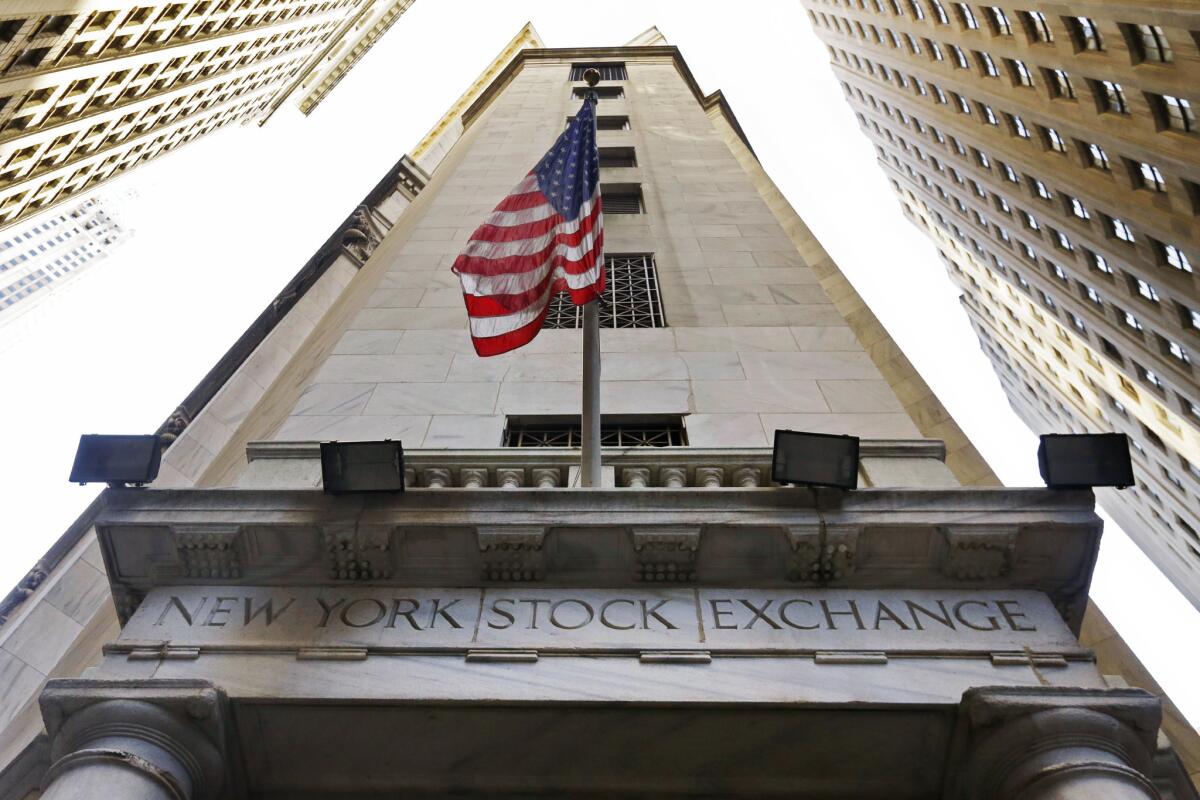Stocks notch tiny gains, starting September on a quiet note

- Share via
U.S. stocks staged a late recovery Thursday and finished mostly higher, led by technology and metals companies. Energy companies continued to fall with the price of oil.
In early trading, the Dow Jones industrial average lost as much as 105 points. But those losses faded midday and stocks finished more or less where they started. Banks and utility companies slipped, and energy companies took losses as oil prices fell for the fourth day in a row.
It has been almost two months since the stock market last made a big move. The market recorded a tiny loss in August after an extraordinarily quiet month.
Benchmark U.S. crude is down more than 9% this week, but it has stayed between $40 and $50 a barrel for about five months.
Lowell Yura, a portfolio manager at BMO Global Asset Management, said investors shouldn’t worry about the recent decline because energy companies have had more than a year to strengthen their financial positions in response to lower oil prices. So even if oil prices fall further, it won’t cause much damage to bonds or the broader stock market.
“We’ve had some time now for that sector to prepare for lower oil prices for longer,” he said. “In the long term it’s really hard to imagine a world in which low oil prices are bad for growth.”
The Dow rose 18.42 points, or 0.1%, to 18,419.30. The Standard & Poor’s 500 index slipped 0.09 of a point to 2,170.86. The Nasdaq composite rose 13.99 points, or 0.3%, to 5,227.21.
U.S. crude oil fell 3.4% to $43.16 a barrel. Brent crude, the benchmark for international oil prices, fell 3.1% to $45.45 a barrel in London. Shares of Valero Energy went down 1.9% to $54.29.
Diamond Offshore Drilling slumped 10.6% to $16.51 after the company said Brazilian oil company Petrobras is terminating a contract with it. Diamond said that the contract was scheduled to end in October 2018 and that it does not believe Petrobras’ actions are legal.
Technology companies made the biggest gains. Hewlett Packard Enterprise, based in Palo Alto, climbed 3.2% to $22.16.
Nvidia advanced 3% to $63.15 after the Santa Clara graphics chipmaker said it would work with Chinese e-commerce company Baidu to develop an autonomous driving system. Baidu rose 3.2% to $176.62.
Campbell Soup slid 6.3% to $56.91 after disappointing results from the company’s fresh products unit. The company said carrot sales fell because of a premature harvest that resulted in smaller vegetables, and a recall hurt sales of its Bolthouse Farms beverages. The maker of canned soups, Pepperidge Farm cookies and V8 juices has been trying to capitalize on a growing desire for fresh foods.
Costco stock fell 3.6% to $156.21 after the wholesale club operator reported weak sales for August. The company said sales at older stores were unchanged compared with last year; analysts expected some growth.
Materials companies made some of the largest gains. Gold producer Newmont Mining jumped 3.1% to $39.43 and steel maker Nucor rose 1.6% to $49.30.
Casino companies rose after spending on gambling in Macau rose for the first time in more than two years. The Gaming Inspection and Coordination Bureau said gross revenue from gambling rose 1.1% in August. Gambling revenue in Macau plunged 34% last year and it’s down about 9% this year. Wynn Resorts rose 4.3% to $93.17, and Las Vegas Sands climbed 7.2% to $53.81.
Cable company Charter Communications, which recently bought Time Warner Cable and Bright House Networks, rose after S&P Dow Jones said it will be added to the Standard & Poor’s 500 index next week. Charter shares advanced 4.5% to $268.82.
Salesforce.com slid 4.4% to $75.91 after the San Francisco developer of customer-management software released third-quarter guidance that didn’t impress investors.
U.S. manufacturing shrank in August for the first time since February as orders and output fell and factories cut jobs. However, there were signs that the weak global economy won’t hurt U.S. manufacturers as much. Chinese factory managers said they expect to do more business, and European manufacturers reported continued growth.
“There’s no real sign that we’re near the end of a cycle,” said Yura, of BMO Global Asset Management.
U.S. government bond prices didn’t move much. The yield on the 10-year Treasury note fell to 1.57% from 1.58%. The dollar fell to 103.32 yen from 103.44 yen and the euro rose to $1.1197 from $1.1162.
Wholesale gasoline dropped 6 cents to $1.27 a gallon. Heating oil fell 4 cents to $1.38 a gallon. Natural gas fell 10 cents to $2.79 per 1,000 cubic feet.
The price of gold rose $5.70 to $1,317.10 an ounce. Silver jumped 24 cents, or 1.3%, to $18.94 an ounce. Copper remained at $2.08 a pound.
Germany’s DAX fell 0.6% and Britain’s FTSE 100 fell 0.5%. The CAC 40 in France was little changed. Japan’s Nikkei 225 rose 0.2%. Hong Kong’s Hang Seng index gained 0.8%. In South Korea, the Kospi fell 0.1%.
ALSO
State-run retirement plan heads to California governor’s desk
Hanjin bankruptcy disrupts shipping at L.A. and Long Beach ports
Here’s why drug prices rise even when there’s plenty of competition
More to Read
Inside the business of entertainment
The Wide Shot brings you news, analysis and insights on everything from streaming wars to production — and what it all means for the future.
You may occasionally receive promotional content from the Los Angeles Times.










